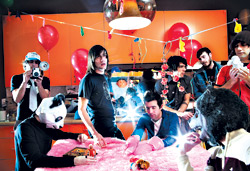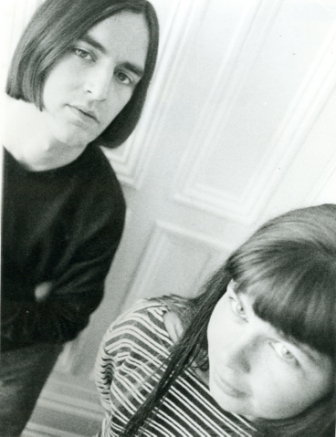When I first heard the Montreal, Quebec–based band Malajube, I couldn’t understand one word of it. It wasn’t that they were singing too fast and I had no lyric sheet to run off—it was because Malajube sing in French and, admittedly, the extent of my French-language knowledge is probably covered in the first week or two of French 101, if that. Of course, it’s not as though I’m not fascinated and intrigued by it—I am. My appreciation for the language really blossomed when I first listened to Serge Gainsbourg many years ago. Now every time I hear someone singing in French, the language has me under its sexy, mysterious spell.
From the moment I first heard the band on their latest stunning release, Trompe l’Oeil (translation: “Trick the Eye”), I’ve been drawn to their bewildering, catchy arrangements, intricate melodies, and entirely twisted yet beautiful approach to songwriting—where no two songs sound alike. When they want to have fun, they have fun. When they want to be endearing, they are endearing. And the tone in the voice of Julien Mineau, Malajube’s guitarist and principal vocalist, has a range from a gentle, romantic whisper to a wild, rabid yelp, backed by huge vocal harmonies throughout.
“Words that you don’t know can still have a real meaning,” says Mineau, “I grew up listening to music I didn’t understand. I enjoy English music more than French music, but I would feel so bad singing in English. It was my own language, and I would not be speaking the truth. That’s the only way I can do it, and I feel good doing it. It feels good to do something new with French words.”
After playing in and around Montreal’s hardcore scene, Mineau formed Malajube in 2002 with his brother, Francis (drums), Thomas Augustin (keyboards), and Mathieu Cournoyer (bass). “We were living all close together and wanted to start a happier band—a fun band,” says Mineau. “We wanted to play more soft music.”
Mineau says the band started off slowly, but soon they began playing basement shows around Montreal and released two demos. In 2004, they recorded their debut, Le Compte Complet, on a shoestring budget with the Dears’ Martin Pelland behind the boards. The album was quietly released in November on Montreal indie label Dare to Care Records. Before long, tracks from the album were all over college radio stations in Quebec, propelling the band’s popularity. Soon thereafter, the Canadian government, which is very supportive of the arts and provides financial support to up-and-coming artists through the Canada Music Fund, came knocking on Malajube’s door. In the wake of the success of Le Compte Complet, Malajube received enough money to quit their day jobs and record their follow-up, Trompe l’Oeil, again for Dare to Care. This opened the gates for the band to finally do something huge.
“It was a dream come true for us, being in a studio for so long. It was a routine. We would go there every day for three months,” says Mineau. “We wanted to portray ourselves further musically.”
Despite the enthusiasm within the band, a series of events unfolded in Mineau’s personal life that were downright serious: Both his mother and sister were diagnosed with cancer. Mineau coped with the bad news by writing songs like “Le Crabe (cancer).”
“I realized when I was singing, there were a lot of strange diseases around me,” explains Mineau. “It was kind of depressing, but it was good for us.”
On Trompe l’Oeil, songs relating to disease and medical diagnoses are physically evident in the song subtitles. “La Russe (syndrome gilles de la tourette)” looks like it could be about Tourette’s syndrome; “Casse-cou (schizophrenie)” juggles a conversation between Jesus and Satan (something common among those with schizophrenia); and “Jus de Canneberges” translates into cranberry juice, the drink of choice for those suffering from a urinary tract infection. But then again, what do I know?
Whatever Malajube are singing about, rarely do they ever sound sad, and the band’s love for English-speaking pop bands like Flaming Lips, Super Furry Animals, and the Beatles shines throughout Trompe l’Oeil—from the crystalline pop of “Montréal -40°C” and “La Monogamie” to a romping piano jamboree, “Ton Plat Favori,” and a sweepingly beautiful “Étienne d’Août.” The music alone is inspiring, and leaves me at a loss for words, French or English.
“It’s kind of strange to imagine how someone [who only speaks English] listens to the songs,” says Mineau.
Tell me about it.






